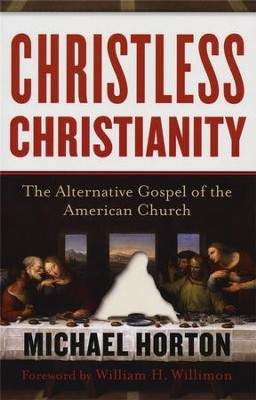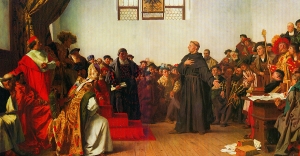When I first began to become Reformed (c. 1980) I was familiar with the second service because my Southern Baptist congregation had an evening service. Indeed, we had a Wednesday evening service in addition to the Sunday morning service. Oddly, much to . . . Continue reading →
Reforming Worship
D. G. Hart To Speak At NW Atlanta Reformed Conference May 21, 2022
D. G. Hart, Distinguished Associate Professor of History at Hillsdale College is the featured speaker at the second annual Northwest Atlanta Reformed Conference Saturday, May 21, 2022 (9:00–Noon) to be held at Christ Orthodox Presbyterian Church (495 Terrell Mill Rd., Marietta, GA). The . . . Continue reading →
Heidelcast 203: A Christmas Story (With A Santa Clause)
We’re interrupting our series on the Apostles’ Creed to talk about Christmas. Usually at this time of year I post or repost some of the essays on the Heidelblog about Christmas but this year I thought it might be useful to talk . . . Continue reading →
Five Reasons We Do Not Need Ken’s Doxology
In a recent essay I mentioned in passing that we do not need Bishop Ken’s seventeenth-century substitute (i.e., “Praise God from whom all blessings flow…”) for the Psalms since there are five doxologies inspired by the Holy Spirit and included in the Psalter . . . Continue reading →
Keith Getty’s Critique Of Contemporary Worship Music Is A Step In The Right Direction
In 2008, Mike Horton called attention to the phenomenon of a radically subjective turn in American evangelicalism, in Christless Christianity. Unfortunately, a single book diagnosing the deep sickness of American evangelical Christianity was not enough to turn the tide. In that volume . . . Continue reading →
Does Your Worship Need To Be “Elevated”?
Reconsidering The Offering As An Element Of Worship After Covid
Introduction: The Hypothesis Tested Way back in 2008 I asked the question whether the offering is an element or a circumstance of worship or neither? I argued that the offering is neither an element nor a circumstance and thus raised the question . . . Continue reading →
Making Melody With Instruments Versus Making Melody In The Heart
The Ancient Christian church did not use musical instruments in public worship. They did not enter public worship in the West until the middle of the 8th century, i.e., well into the early medieval period. Further, that was one isolated instance, in . . . Continue reading →
Calvin: Musical Instruments Were Intended Only For God’s Ancient People
The musical instruments he mentions were peculiar to this infancy of the Church, nor should we foolishly imitate a practice which was intended only for God’s ancient people. But the Psalmist confirms what has been already mentioned, that their religious assemblies which . . . Continue reading →
The Reformed Rejection Of Alleged “Adiaphora” In Worship In 1578
And in the first place, as relates to the administration or performance of the sacraments, these are observed with Christian and fitting reverence in the churches of this land as they were instituted and ordained by Christ and were used by the . . . Continue reading →
Singing In Acts 16:25 And Plausibility Structures
In the English Standard Version Acts 16:25 says “[a]bout midnight Paul and Silas were praying and singing hymns to God, and the prisoners were listening to them…”. Several other translations (e.g., NASB, NIV, TEV, ASV, RSV, NLT, NKJV, HCSB) follow this or . . . Continue reading →
Help Les Make A Film About Worship
Les Lanphere is the filmmaker who gave us CALVINIST. Les and Tanner host the Reformed Pubcast. He is working on a new film on a most important topic: worship. Continue reading →
A Grown Man Reads Praise Song Lyrics
Today’s edition of “Grown Man Reading Praise and Worship Lyrics.” pic.twitter.com/VvhkVB8Xtf — Christopher Jackson (@revcjackson) April 11, 2018
Recovering The Importance Of The Public Reading Of Scripture
Bible reading has become a largely private practice—something we do in our own personal “quiet time.” A few verses, or perhaps as much as a chapter, are often read before the sermon on Sunday morning. But when was the last time you . . . Continue reading →
1578 Synod Of Dort: Organs To Be Removed ASAP
77. We do not consider the use of organs in the churches to be good especially for the preaching (services). Therefore, we judged that ministers should labor, even though organs are tolerated for a time, that they be removed at the earliest . . . Continue reading →
Synod Of Dort (1578): Psalms Only To Be Sung In Worship
76. The Psalms of David translated by Pieter Datheen shall be sung in the Christian gatherings of the Netherlands churches as has been done until now, excluding the hymns which are not found in the Bible. National Synod of the Netherlands, German, . . . Continue reading →
The Judgment Of A 1574 Dutch Provincial Synod On Organs And Alms
50. As to the playing of organs in the church, it is maintained that this should be completely discontinued in accordance with the teaching of Paul in 1 Corinthians 14:19. And although some of these churches still use it at the end . . . Continue reading →
Worship Characterized By Rock Music, Stand-Up Comedy, Beautiful People, & Hallmark Sentimentality
The problem with much Christian worship in the contemporary world, Catholic and Protestant alike, is not that it is too entertaining but that it is not entertaining enough. Worship characterized by upbeat rock music, stand-up comedy, beautiful people taking center stage, and . . . Continue reading →
Worship: A Dialogue Not A Checklist
Most of the debate over the so-called “worship wars” for the last 30 years has focused on the disagreement between those who favor a progressive/contemporary style of worship and those who favor a more “traditional” style of worship. One of the reasons . . . Continue reading →
Sola Scriptura Protects Christian Liberty
In April 1521, when Martin Luther stood before the powers of this world at the Diet of Worms, he did so on the basis of the sole, unique, and final authority of God’s Word. Luther confessed that his conscience was bound by . . . Continue reading →












